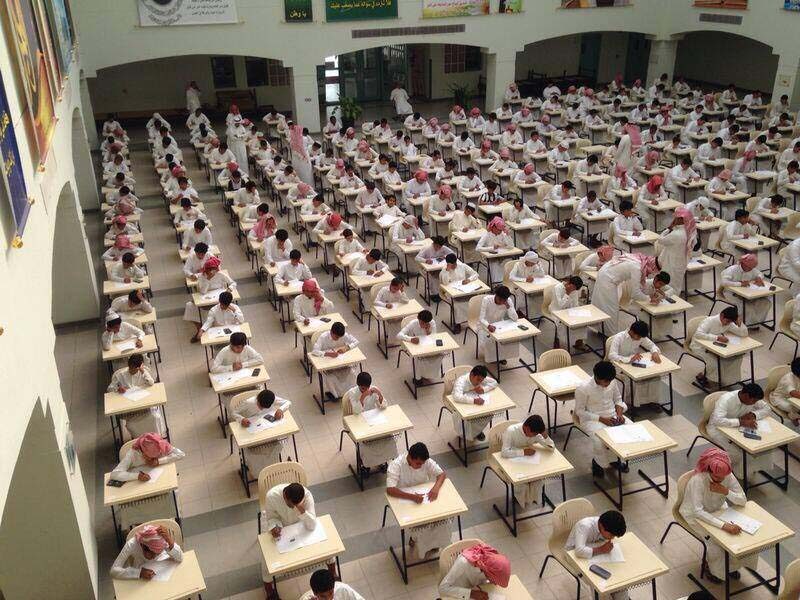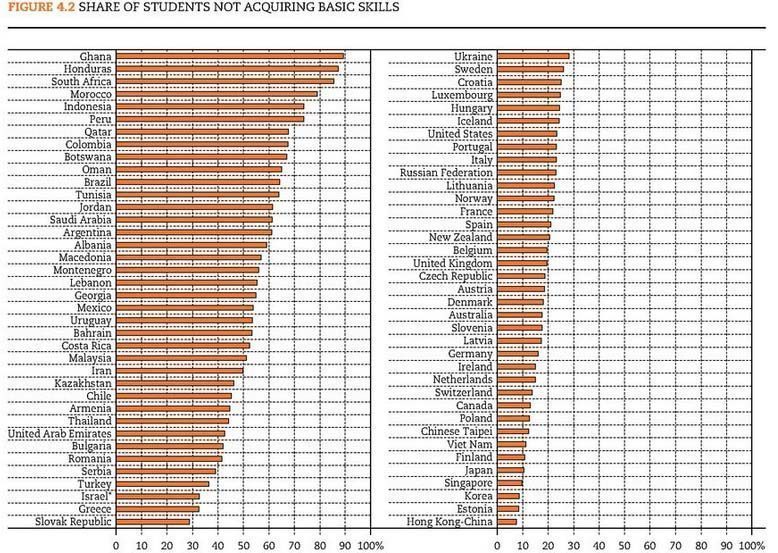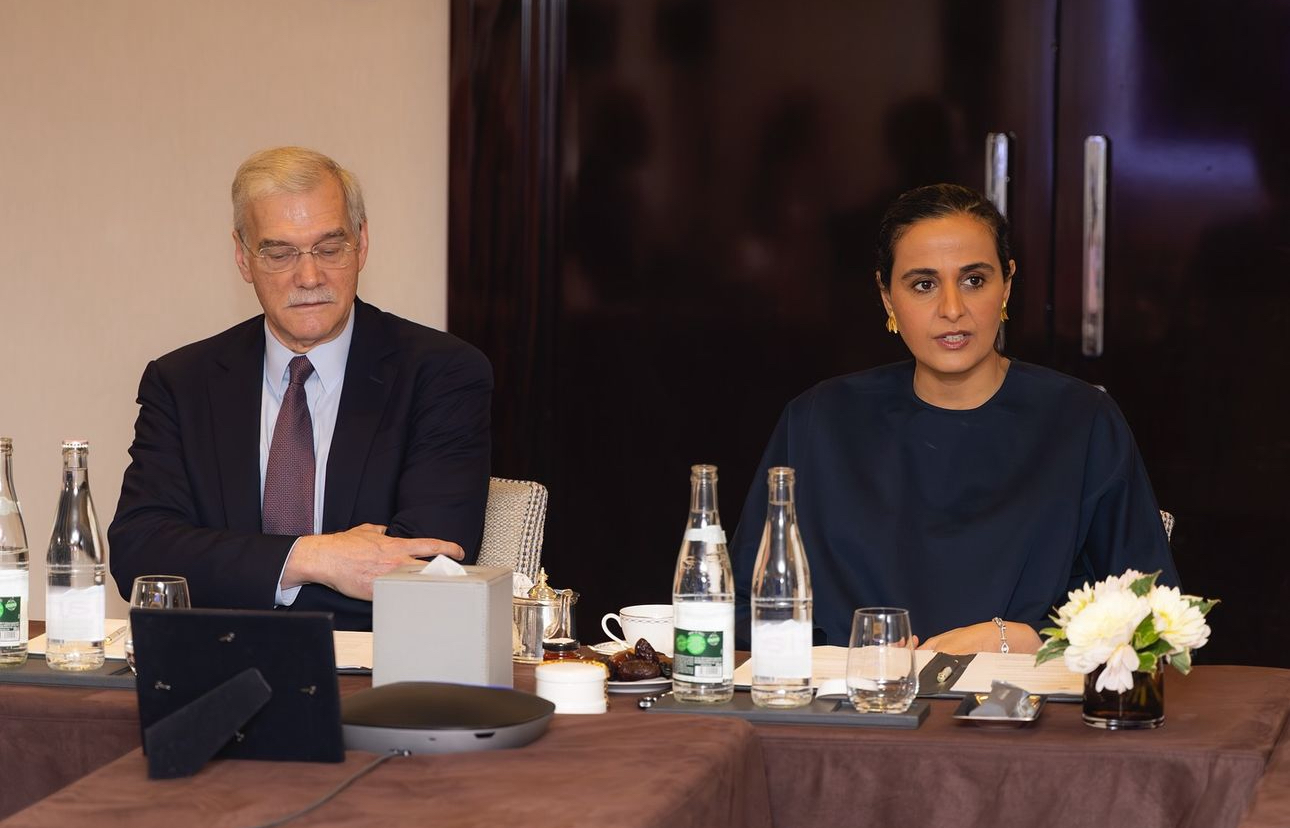
Students in Qatar continue to be among the world’s poorest performers, according to a new global education ranking that scored the nation behind most of its regional and international peers.
The Organization for Economic Cooperation and Development (OECD) has published its biggest-ever league table of educational attainment in 76 countries, which for the first time includes under-developed and developing nations, as well as richer states.
The report, Universal basic skills: what countries stand to gain, examined how representative samples of 15-year-olds performed in math and science tests, ranking them relative to their peers in more than a third of the world’s nations.

Qatar came in 68th place overall. Coming only ahead of Oman (72nd), it was among the GCC’s poorest performing countries.
None of the Gulf states did particularly well, with all ranking in the bottom half of the index. Students in the UAE came in 45th place, Bahrain followed at 57th and Saudi Arabia in 66th position. Kuwait did not appear in the index.
Ghana came in last overall, in 76th place, while the rankings’ top five spots were all taken by Asian nations, including Singapore, Hong Kong, South Korea, Japan and Taiwan.
Maintaining its reputation as having one of the world’s best education systems, Finland ranked as the best-performing European country, at 6th. The United Kingdom took 20th place, while the United States was slightly further behind as it tied in 28th place with Italy.
However, some education leaders have warned that indexes can give a generalized and distorted view of the real situation of education levels in a country.
Speaking to Doha News, Niall Brennan, director of Park House English School, a private international school in Qatar, said:
“League tables based on narrow data fields should be interpreted with care and often do not represent the full picture.
Qatar has some excellent international schools which focus on equipping pupils with essential life skills such as critical thinking and problem solving as well as learning the key facts.”
Ranking system
The index used statistics from a number of international assessments, including OECD’s most recent PISA tests, which are conducted every three years to assess the knowledge and skills of 15-year-olds, and chart how nations’ education systems are performing.
Also included were figures from TIMSS tests run by US-based academics and TERCE tests in Latin America, to create a single rankings system.
In the 2012 PISA tests, which are the most recent, half-a-million 15-year-old students from 65 countries were evaluated in math, reading, science and problem-solving, as well as financial literacy.
Students here performed below average in all three categories, putting the country at the bottom of the rankings, at 62nd overall. However, the Gulf nation appeared to show signs of improving since students here were first assessed in 2006.

Both Qatar’s independent (state-funded) and private, international schools were included in the PISA test.
However, a subsequent OECD report published last July found significant performance differences between students from the public and private sectors.
Out of the 47 countries assessed for the summer report, Qatar’s private school students had the biggest advantage over their state peers, with a 108-point differential – putting the nation at the bottom of the table in terms of education equality.
Its results also showed that state-educated children were three years behind their private schools peers in math ability.
Future benefits
More than two-thirds (68 percent) of Qatar’s students didn’t pass the basic PISA levels in math and science, which equate to a score of 420.

This is despite high school enrollment rates at being approximately 98 percent in Qatar.
But if all the 15-year-olds went to school and achieved the basic skill levels, then the “long-term economic gains are going to be phenomenal,” OECD’s education director Andreas Schleicher told the BBC, speaking about the potential of countries that improve their education systems.
According to the report, Qatar figures in the top 10 countries with the most potential for economic growth. Its current GDP could increase by 1,029 percent over the lifetime of its students if it boosts its education system and raises their achievement levels, OECD said, adding that these reforms would be worth around $3.6 trillion.
Warning
The authors of the report also issued a warning to non-OECD oil-producing countries, which includes many of the Gulf states that it said appear to have become complacent in improving education standards.
Commenting that “high-quality schooling and oil don’t easily mix,” the report said that resource-rich nations “have failed to convert their natural capital into the human capital that can generate the economic and social outcomes that can sustain their future.”
It continued:
“There is an important message for countries rich in natural resources: the wealth that lies hidden in the undeveloped skills of their populations is far greater than what they now reap by extracting wealth from natural resources.”
It goes on to say that the PISA results show a “significantly negative relationship” between the money earned by countries which are rich in natural resources, and the knowledge and skills of their high-school population.
Efforts to improve
Qatar’s need to improve its education standards, particularly in the independent sector, is not new. The Supreme Education Council’s Schools and Schooling report, which was published in 2013, highlighted a number of issues affecting performance in government schools.

These include that one-third of independent school teachers did not have formal teaching qualifications; there were high levels of student absenteeism; and wide variations in the amount of homework set in schools.
In response, several initiatives have been brought in to tackle these problems.
The Teach for Qatar program, launched last year, trains college graduates and high-performing professionals as teachers. Meanwhile, Qatar University’s College of Education runs ongoing professional development courses to raise and maintain teachers’ skills levels.
See the full OECD report online here.
Thoughts?







